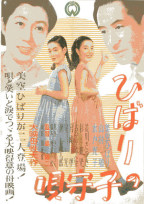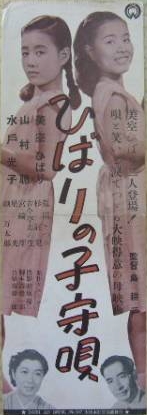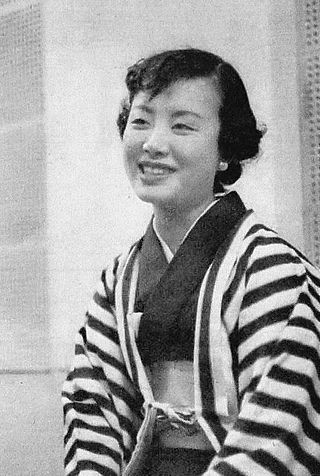
Hibari Misora was a Japanese singer, actress and cultural icon. She received a Medal of Honor for her contributions to music and for improving the welfare of the public, and was the first woman to receive the People's Honour Award, which was conferred posthumously for giving the public hope and encouragement after World War II.
Inugami Circus-dan (犬神サーカス団) are a Japanese rock band. The band's name literally translates to The Dog-God Circus Troupe. Their costumes typically consist of the female singer wearing a kimono, and the rest of the band wearing military-style uniforms. They also wear Gothic and Kabuki style make-up.

Stop!! Hibari-kun! is a Japanese manga series written and illustrated by Hisashi Eguchi. It was serialized in Shueisha's shōnen manga magazine Weekly Shōnen Jump from October 1981 to November 1983, and the chapters were published in four tankōbon volumes. The series was adapted into a 35-episode anime television series by Toei Animation that aired on Fuji Television from May 1983 to January 1984. The story focuses on Kōsaku Sakamoto, a high school student who goes to live with yakuza boss Ibari Ōzora and his four children—Tsugumi, Tsubame, Hibari and Suzume—after the death of his mother. Kōsaku is shocked to learn that Hibari, who looks and behaves as a girl, was assigned male at birth.
Itsuki Lullaby is a lullaby known widely in Japan, and is a folk song representative of Itsuki Village, Kuma District, Kumamoto Prefecture, on Kyūshū Island.
"Takeda Lullaby" is a popular Japanese cradle song. It originated in Takeda, Fushimi, Kyoto.
Edo Lullaby is a traditional Japanese cradle song. It originated in Edo, was propagated to other areas, and is said to be the roots of the Japanese lullabies.
Chugoku Region Lullaby is a traditional folk song in Okayama Prefecture, Chugoku region, Japan, and is a well known Japanese cradle song.
Shimabara Lullaby is a folk song-like lullaby by Kohei Miyazaki of Shimabara, Nagasaki Prefecture, Japan.
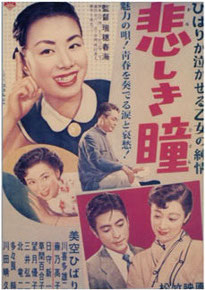
Hibari no kanashiki hitomi (ひばりの悲しき瞳) is a 1953 black-and-white Japanese film directed by Mizuho Shunkai.

Hibari no Sākasu kanashiki kobato (ひばりのサーカス 悲しき小鳩), "Hibari's Circus: Sad Little Dove" is a 1952 black and white Japanese film directed by Mizuho Shunkai.

Tarō Shōji was a popular Japanese ryūkōka singer. He also used the aliases Shōji Shirō (庄司史郎), Asabuki Kaoru (朝吹薫), and Fujiwara Hideo (藤原英夫) in his early recording career.
Lullaby of the Earth is a 1976 Japanese film directed by Yasuzo Masumura.

Tora-san's Lullaby is a 1974 Japanese comedy film directed by Yoji Yamada. It stars Kiyoshi Atsumi as Torajirō Kuruma (Tora-san), and Yukiyo Toake as his love interest or "Madonna". Tora-san's Lullaby is the fourteenth entry in the popular, long-running Otoko wa Tsurai yo series. It marks the debut of actor Masami Shimojō in the role of Tora-san's Uncle Tatsuzō. The third actor in this role, Shimojō would play the character until the end of the series.

Famureuta is Rimi Natsukawa's second EP, released on October 22, 2003. It consists solely of recordings on lullabies. It is her second EP that solely features cover songs.
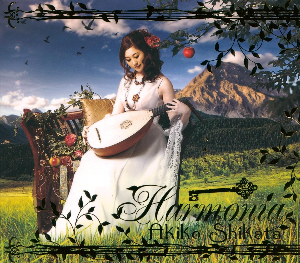
Harmonia is the third major studio album by Japanese pop artist Akiko Shikata. It was released on March 18, 2009.
Tsubasa o Kudasai is a popular Japanese folk song written by Michio Yamagami (山上路夫) and composed by Kunihiko Murai (村井邦彦).

The Sad Whistle is a 1949 Japanese drama film directed by Miyoji Ieki.
Pretty Cure All Stars: Singing with Everyone♪ Miraculous Magic! is a 2016 Japanese animated action fantasy musical film based on the Pretty Cure franchise created by Izumi Todo. The film is directed by Yutaka Tsuchida, written by Isao Murayama, and produced by Toei Animation. The film was released in Japan on March 19, 2016.
